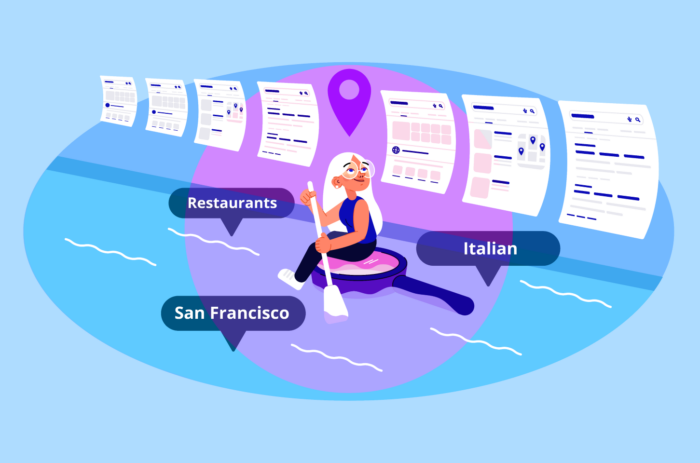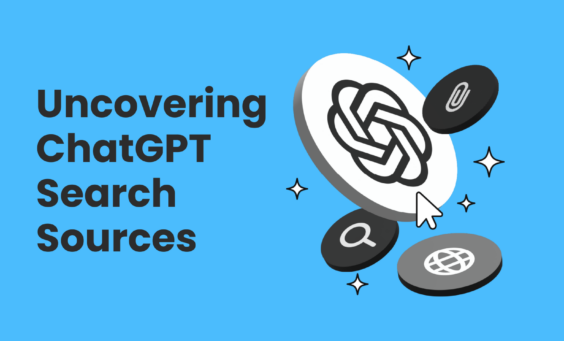If you’re just getting started with local SEO, or figuring out how to get more visibility for a local business, welcome!
Our guide to Google local search is jargon-free, up to date, explains everything in plain English, and is packed with easy-to-action tips.
We’ll touch on the essential local SEO tools you’ll need to make your life easier and provide you with a complete overview of which areas you need to focus on to make your business more visible to local customers. So, let’s get started!
The Basics: Why local search?
If you’re new to Google local search or have come over from traditional SEO, you may wonder where it’s come from and why it’s so important to local businesses everywhere. The answer to this question lies with a piece of tech that you likely have in your pocket, in your hands, or on your desk right now—your smartphone.
The widespread availability of mobile technology has seriously changed how we behave as consumers. We can now hop online at any time, from any location, and search for something we need or want. That means that anything from the nearest pizza place to the pet grooming parlor (plus any product or service you can think of in between) is just a few taps on your smartphone screen away.
Constant connectivity equals convenience, so more and more, everyday shoppers are heading to Google on their phones when they need to find something. According to BrightLocal’s own Local Consumer Review Survey, 21% of consumers go online to find a local business every day, 77% search for a local business at least once per week, and 91% look online for local businesses at least once a month.
It’s easy to see how appearing prominently on Google when local people search for your kind of service can be lucrative!
What is a ‘local search’? How does it differ from a normal search?
A local search is perhaps best described with an example:
You’re driving in town and have a flat tire. You pull out your smartphone, head to your web browser, and type ‘mechanic’ into Google.
Whether or not you add ‘near me’, you’re still performing a local search as you’re looking for a specific service in your local area.
Thanks to modern technology, and provided you’ve allowed for this in your privacy settings, Google can accurately pinpoint your location. It can use your Wi-Fi connection or GPS, for example, to get an idea of where you are and then return results for products, services, and merchants that are in close proximity to your location.
Without getting too technical, proximity between searcher and business is one of the three key pillars of local search (along with relevance and prominence) for businesses looking to get their web presence seen by the right people at the right time.
Google will calculate the distance from the search user to a local business when deciding how to rank search results. It knows that, more often than not, search users need a solution that is close to them—especially when searching on a mobile device.
Is local search just “a Google thing”?
Absolutely not. At the time of writing this, Google still has a 90% market share of internet searches, but that has dipped in recent years.
What’s gaining ground on Google? First, social media platforms like Instagram, YouTube, and TikTok have excellent search and business discovery mechanisms. Then, we have the rise of LLMs like ChatGPT, which are taking their share of people fed up with years of unreliable or clunky Google results who just want a straight answer about local businesses the first time.
While this piece focuses on Google, we’ll be coming back to LLMs and social media later in the piece, as their impact on local search can’t be denied, and you’ll want to consider these platforms if you’re taking local search seriously.
Breaking Down Your Search
You may think there’s nothing much to decode when you type a few words into Google to hunt down a vital product or service. That’s actually not the case, though.
The words and phrases you type in before hitting ‘search’ are a good indicator to Google whether you need something local or a solution from further afield. Let’s look at some of the ways that Google works out if you’re looking for something local.
“Near Me” Searches
Let’s go back to that city drive and your flat tire.
Now, chances are, you don’t just type in mechanic, although that is possible. In your eagerness to return to the road with a fully inflated tire as soon as possible, you might tell Google you’re looking for a “mechanic near me”.
Right away, ‘near me’ triggers a local search, as you need assistance close to your physical location.
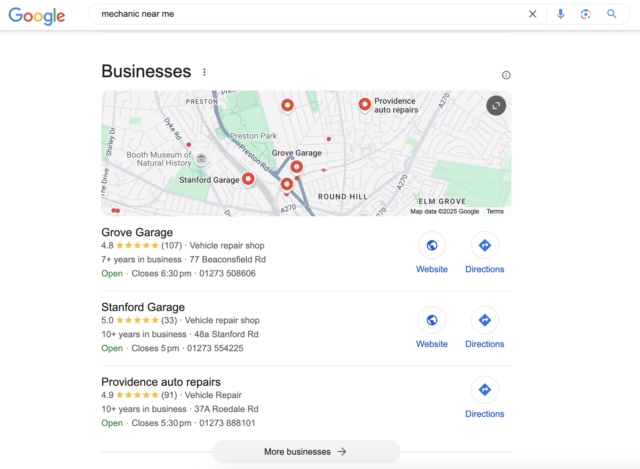
The same is true of your customers’ searches. Whether they’re looking for a pool cleaner or a cable guy, ‘near me’ flags up to Google that only a business close to the searcher’s current location will suffice.
This means that Google knows to present that user with service providers from their immediate area. If you’re a mechanic in that city, you’ll want to ensure that you have your local search visibility taken care of to be visible to that customer and stand a chance of winning that job.
Geo-targeted Searches
In some cases, rather than typing in “near me”, you may simply add your location to the end of the search to be assured that you’ll be served relevant results. For example, “mechanic brighton”.
It’s pretty clear to Google that this is a local search, and so to be useful, it needs to show you listings for mechanics in Brighton.
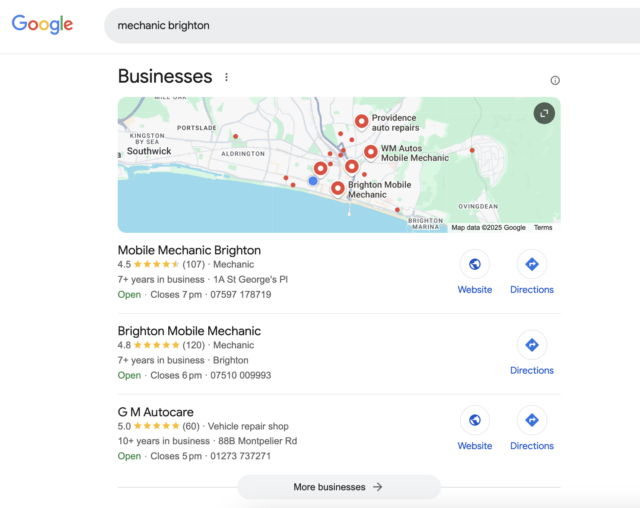
You’d also use geo-targeted searches if you were looking for a place in a specific location that isn’t near you, for example when planning a trip. It’s important to remember this because otherwise, it’s easy to think that ‘local search’ equals ‘near me search’.
Location-enabled Searches
If you have your location enabled on your phone, you can perform a local search without even realizing it. In most cases, if you simply type in ‘mechanic’, you’ll get local results simply because you have location services enabled on your phone (Google is clever enough to know that you’re probably not looking for a definition of a mechanic unless you specifically ask for one).
This can vary depending on the type of business searched for, though. Searches for popular business types like hotels, restaurants, and car dealerships are always likely to trigger a location-enabled search.
What is a local search result in Google?
As we’ve seen, there are several types of ways to make a local search on Google, and fittingly, there are multiple types of local search results, too.
Depending on the device used for the search and the type of search performed, a different type of local search result may be shown.
Here, we just want to share a few terms that pop up most often to describe local search results so you feel comfortable with each one when you carry out local searches, speak to a local SEO agency, or look for local SEO services.
Local Pack
The most common result you’ll see when making a local search for a business is the Local Pack, though Google is doing its best to make AI Overviews the de facto search result—more on this shortly.
The Local Pack is a section of Google’s search results that shows the top local businesses related to your query. Whenever your query has local intent, Google will show a set of local businesses that might answer your query.
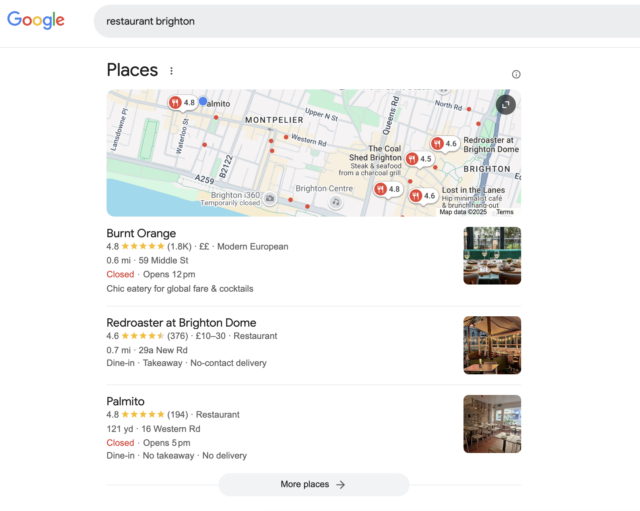
You’ll see the Local Pack appear if you go to Google and type in your search query in the search bar. It will often have an image of a map above or beside it and then usually three suggested local businesses below or to the side, sometimes with snippets of reviews, opening times, justifications, and photos.
For local businesses, this is the ultimate goal in local SEO, as these three spots are generally consistent across mobile and desktop and are by far the most popular way of discovering local businesses on Google.
Google Maps
If you use Google Maps to perform a search, you’ll get local map results. This will show the location of businesses matching your search query on a map with options for filtering according to criteria such as ‘top rated’ or ‘open now’, or even business types like ‘restaurants’.
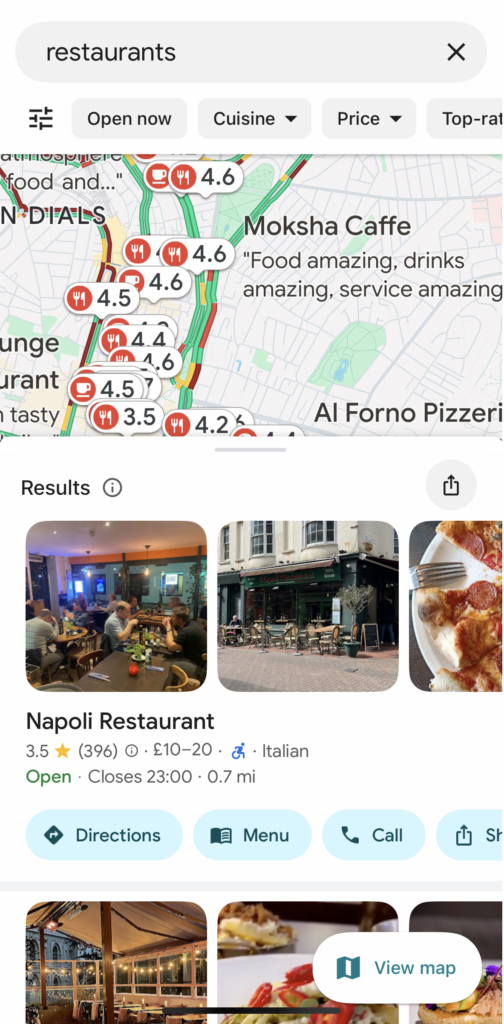
Local Finder
If you click a listing in the Local Pack or scroll through the list of businesses on Google Maps, you’ll get what are called ‘Local Finder’ results. The Local Finder is the source of truth for all local listings on Google.
Wherever you see listings for a particular search term in a particular location, the Local Finder results are what’s being pulled. BrightLocal tracks these positions in our Local Rank Tracker and Local Search Grid.
Google AI Overviews
Getting back to general browser results, today you might find an AI Overview result in response to your local search query. These responses are generated by Google’s Gemini LLM (“AI” is entirely a misnomer—and a deliberate one: there is no “intelligence” going on here, merely pattern recognition and prediction, and the same is true of other LLMs like ChatGPT).
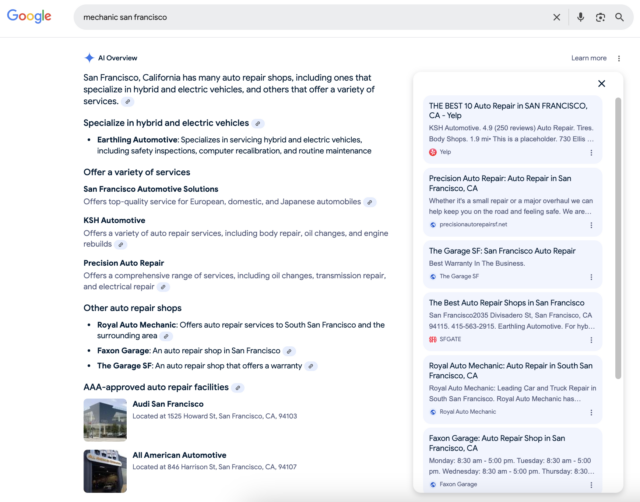
In this local search result type, Gemini does its best to discern what sort of result the user is searching for and pulls from authoritative guides and online sources to compile a response that’s conversational in tone.
The sources themselves are hidden behind ‘link’ icons and in the right-hand box (which I’ve already opened in the screenshot above).
These results are experimental and vary wildly from day to day and from search to search. It’s safe to say that until Google has stabilized Gemini and implemented it fully and consistently, you can’t rely on AI Overviews appearing for any given search, be that local or otherwise.
“Find Results On”
This may vary depending on where in the world you are searching from, but thanks to Google’s ongoing legal issues in the EU (the governing bodies of which want to see Google stop ‘self-preferencing’ in its products) the search giant has had to compromise and place links to other directories prominently in search results.
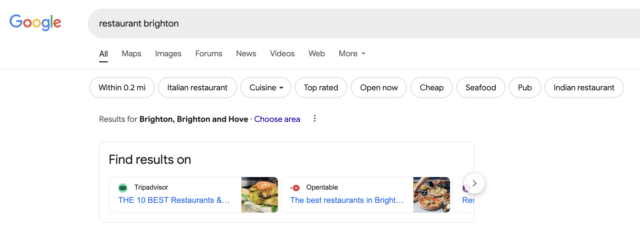
This is why you might see ‘Find Results On’ above even the Local Pack in your search results. The prominence of these directories in local search results (and in organic results) further highlights the importance of getting your business featured in all the right directories.
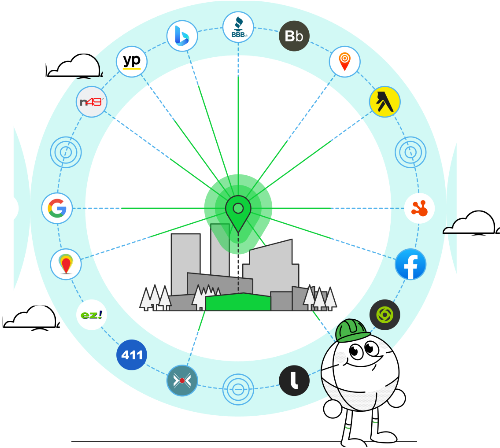
Get Citations Done Fast... and Own Your Listings Forever
No recurring fees. Complete Control. Super-low cost.
Localized Organic Results
Localized organic results are a slightly different version of local search results. These results are shown in the main search area. They aren’t strictly business-related (so they likely won’t include specific local businesses unless they’re performing very well in local SEO for the search term you’ve used), but they do have a strong local connection via their content.
If the searcher is clearly looking for something local, the results will often consist of directory listings or ‘listicle’ style articles (such as “Top 10 Best X in Y”) and articles from local bloggers and newspapers.
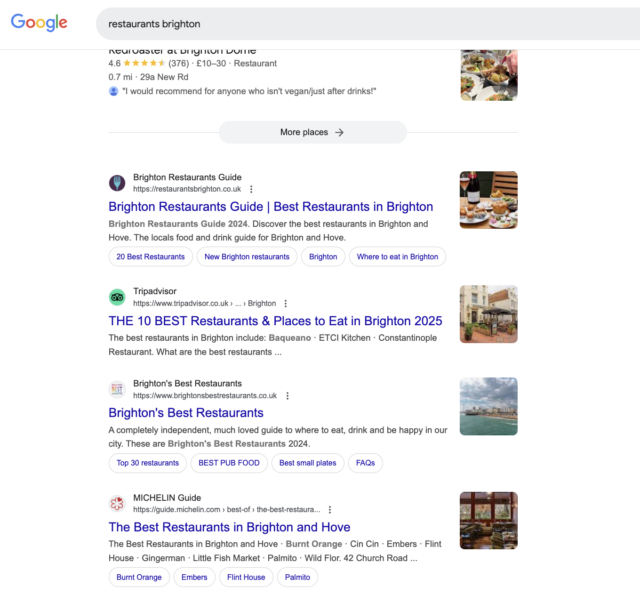
Non-Google Local Search
As mentioned above, we’re now in an era where not everyone relies solely on Google to search the web.
In fact, they might not even need to go to the traditional ‘web’ (as found via a browser). Search behavior has changed so much in recent years that it’s now perfectly normal for someone to, say, use ChatGPT to get restaurant recommendations and details, use Instagram to check out what the food looks like, and then find an impartial video review on YouTube or TikTok to make the final decision.
Our own Local Business Discovery and Trust Report found these to be the top apps for business discovery on social media:
- Facebook (59% of consumers use Facebook to learn about businesses)
- YouTube (49%)
- Instagram (40%)
- TikTok (32%)
- Twitter/X (28%
Let’s take a brief tour of some of these to understand what a local search might look like.
Local Search on Facebook
Facebook is the #1 social media app for business discovery, so we have a dedicated guide to local search and Facebook. For now, let’s move on to some of the others on this list.
Local Search on Instagram
Instagram isn’t quite clever (or perhaps nosy) enough to use your location to prop up a generic search like ‘restaurant’ or ‘restaurant near me’ but if you include a place name, like ‘restaurant new york’, you’ll see posts related to that search, generally from super-popular Instagram accounts.
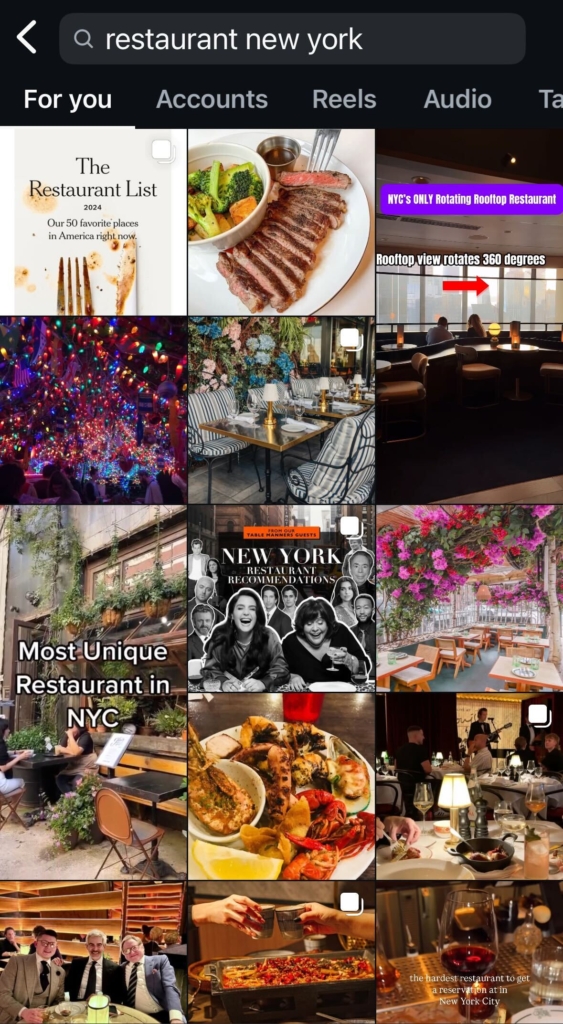
Another way to search for local businesses on Instagram is a clunky one, but it’s great for a more visual way to browse if you love Instagram.
- Type a business name you know is in the area and industry you’re researching into the search bar and scroll over to ‘Places’:
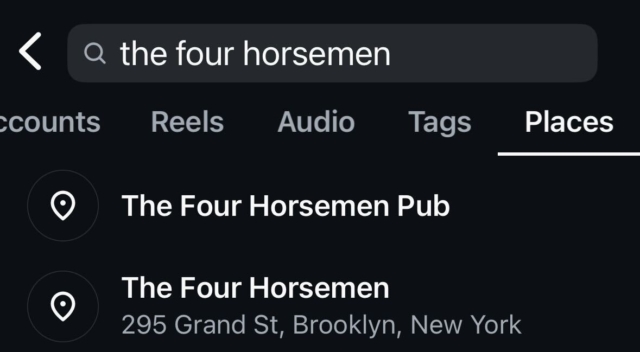
- Tap on the business name to see posts related to that ‘Place’.
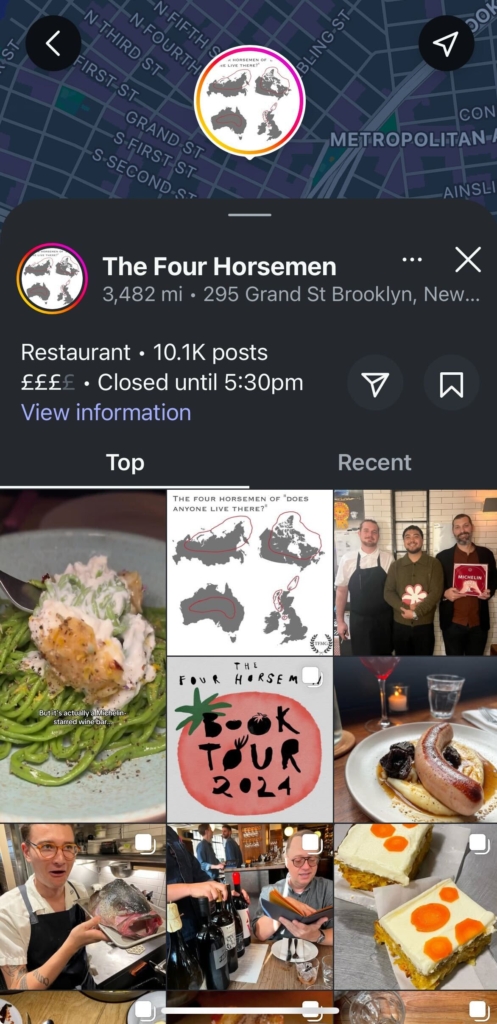
- Zoom out of the map and click ‘Search This Area’ to see a bunch of posts and reels related to your search. That’s where you’ll find similar business types.
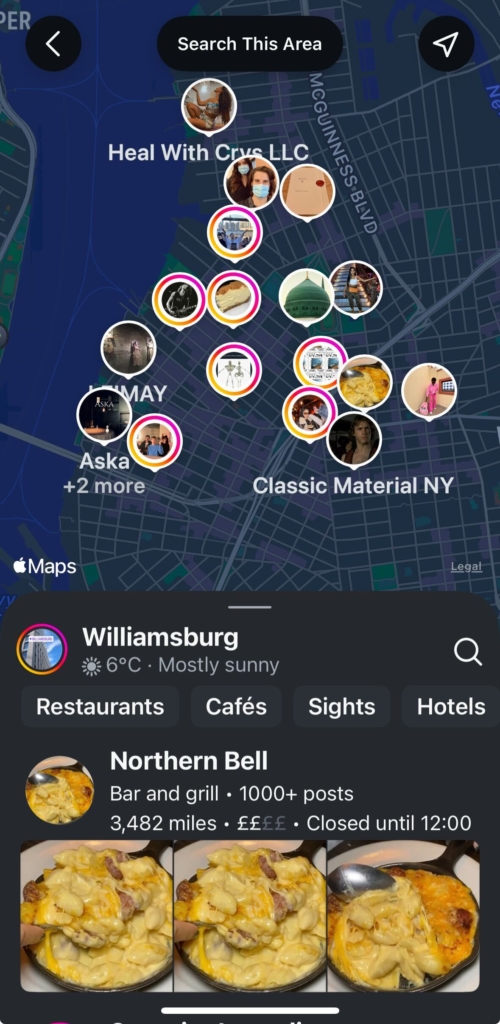
This is a niche trick for Instagram business search, but it works and highlights the importance of having an updated and engaging Instagram presence that’s properly detailed, with opening times and the correct address.
Local Search on TikTok
TikTok works in much the same way for business discovery as Instagram, but with one key difference: TikTok actually gives businesses the equivalent of a directory listing.
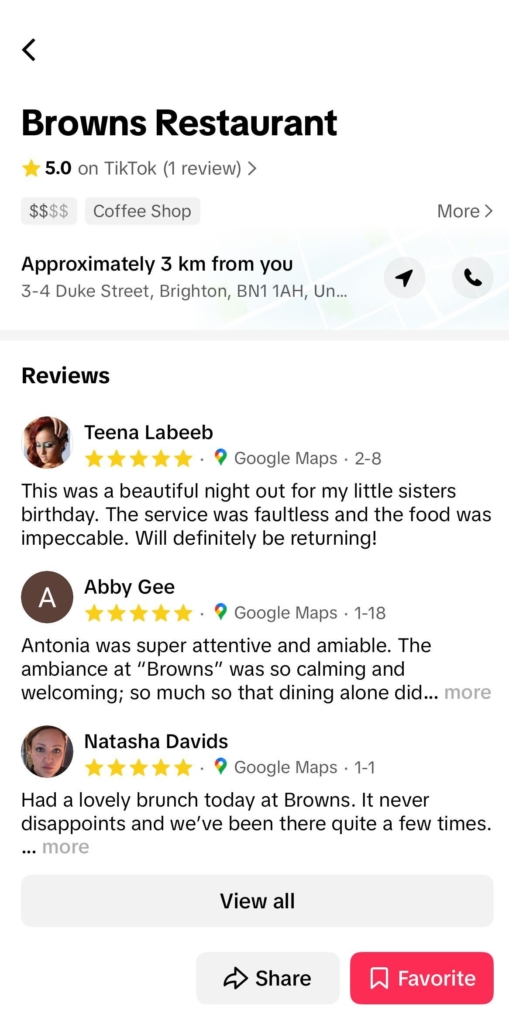
Perform a business search or stumble across a business another way, and you’ll eventually land on the business’s own listing, which contains:
- reviews on TikTok
- reviews from other platforms like Google Maps
- a link to call the business
- a link to find the business on Apple Maps
- the full address, price range, and even…
- an estimate of how close to you the business is (no other platform does this!)
Where does TikTok get this information from? It doesn’t just aggregate it from other platforms, it actually requests business owners to submit and verify their business details via a dedicated form.
With a social media platform taking business discovery so seriously, you can see why Google’s not in the same position it used to be for local search.
Local Search on YouTube
Unlike some of the other platforms mentioned here, YouTube doesn’t need to keep track of your location and doesn’t tailor its search results based on it. Instead, to perform a local search on YouTube, you’ll need to add your location to the search term (e.g. restaurants brighton).
A local search on YouTube provides you with the same kind of results you’d get for a standard YouTube. It’ll likely be comprised of listicles from popular bloggers or review sites, peppered with sponsored posts from content creators or the businesses themselves.
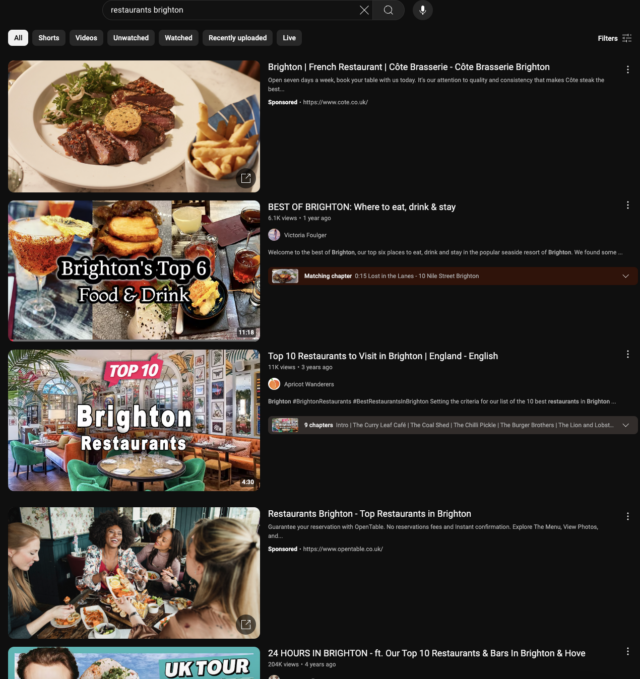
Where YouTube really comes into its own is in individual product or business reviews. Depending on the sector, you could find a host of reviews to help you make a local business decision, or better yet, local experts who take the time to provide their unbiased reviews.
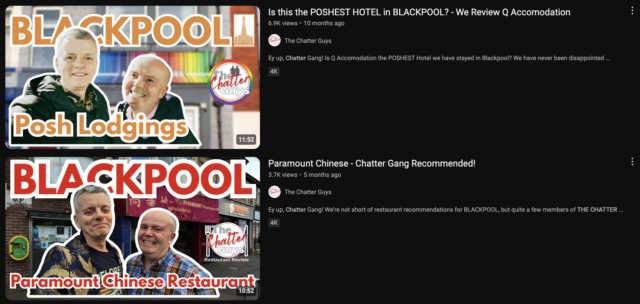
ChatGPT (and other non-Google LLMs)
Finally, we come to LLMs like ChatGPT, and LLM-powered search engines like Perplexity and Arc Search. What all these have in common is that they’re less ‘search engines’ and more ‘answer engines’. By this, I mean that they’re designed to provide clear answers to questions, rather than a host of results for the user to browse around and use to come to their own conclusions.
They’re designed for conversational activity, so you can start a local search with a simple question like ‘where is a good coffee shop in brixton’, and then refine the results conversationally, without having to repeat the question, like so: “which of these is close to t a train station”. This sort of conversation is what LLM providers mean when they say things like “it can help you plan an entire trip”.
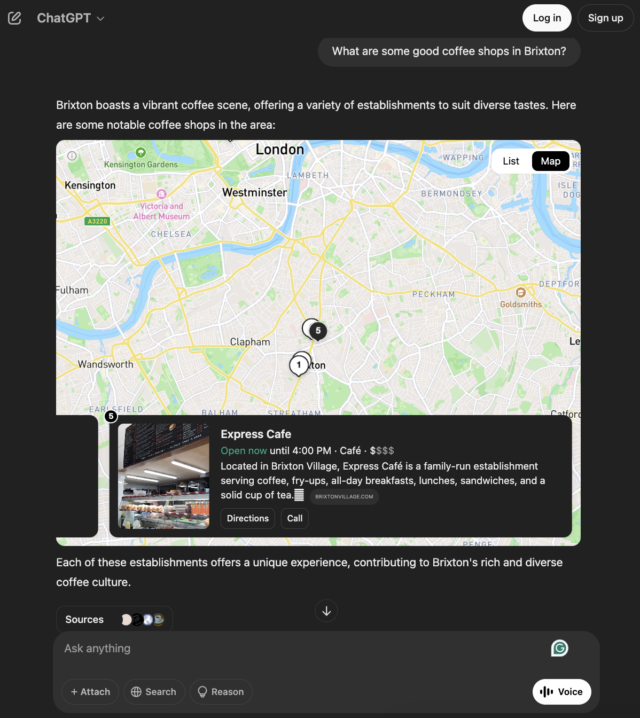
As you can see in the screenshot above, ChatGPT answers local business questions with a map and a carousel of businesses it’s highlighted as suitable for the search term. Want to know which sources it used to decide on this list? Just click ‘Sources’ at the bottom, and ChatGPT will provide you with the list of top sources (usually business websites, authoritative blogs, directories, or local news sources) that it used.
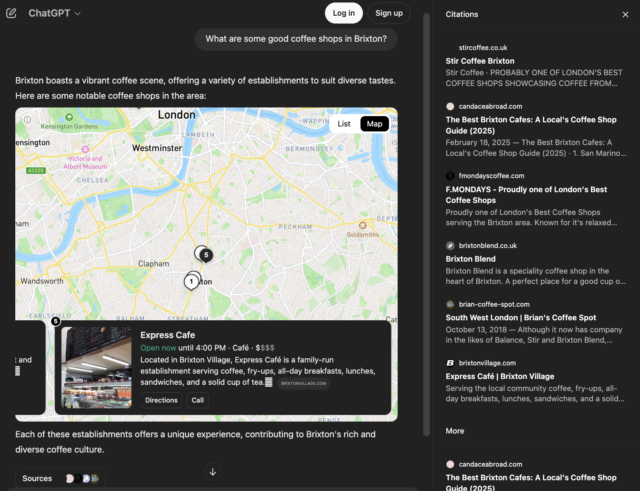
Where do LLMs get the bulk of their information from? The training data used (and how up-to-date it is) is different depending on the LLM you choose, but by far the most popular, ChatGPT, primarily uses Microsoft Bing as its search engine, leveraging its data to provide up-to-date information when searching the web through the “ChatGPT Search” feature. This is because OpenAI, the developers of ChatGPT, have a partnership with Microsoft, which owns Bing.
What about other search engines?
While they’re not nearly as popular as Google, there are a multitude of niche or localized search engines available, from industry stalwarts like Yahoo! and Bing to others like Baidu and Yandex. Take a look at our guide to alternative search engines to learn how local search works on those platforms.
Conclusion
Now that you know the differences and commonalities between local search types and local search results, you can dive further into learning what affects these things.
Whatever you do, always be testing and learning. There’s no such thing as set-it-and-forget-it in SEO, and local search is no different. Even citations have to be updated sometimes!
